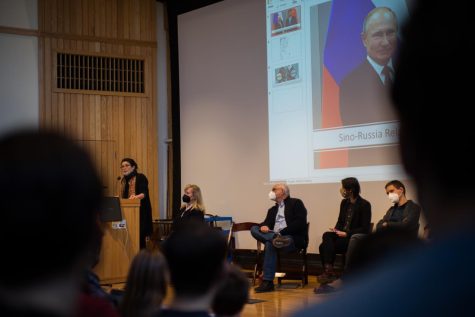Stevens Strategy Presents to General Faculty Amid Controversy
Editor’s Note: A revised version of the letter mentioned in this article is filed under Letters to the Editors. It can be found online at the following link: https://wp.me/p4BnSC-4ak
Stevens Strategy, the academic consulting firm President Carmen Ambar tapped to lead the upcoming Administrative and Academic Professional Review, presented its intended strategy to the General Faculty Council Monday. Amid pre-existing skepticism from faculty members, many who attended the meeting felt the firm came across as unprepared, further heightening concerns.
The firm describes itself as “a full-service consulting firm specializing in managing the process of strategic change in colleges, universities, and schools.” Stevens Strategy will evaluate all aspects of campus in a data-centered review.
But the night before the meeting, Chair of the Politics department and James Monroe Professor of Politics and East Asian Studies Marc Blecher and Chair of the French and Italian department and Ruberta T. McCandless Professor of French Matthew Senior sent an email to all faculty members expressing concern about the group. They cited alleged incidents of error at previous universities where the group had conducted similar reviews.
The email described the process as “asking people to dig their own graves and look into the hole before being pushed in.”
“[Marc Blecher] and I became concerned that Stevens Strategy was not a good fit for Oberlin,” Senior said, explaining what prompted him to write the letter. “They are very involved in online and media-delivered learning; their statistical models and reference groups are derived from work with career-oriented schools. We also are concerned that the review process will create a state of exception in which the normal laws guaranteeing faculty governance and protecting tenure will be suspended.”
On top of faculty wariness of the firm’s practices, faculty and professional staff claim that the group was unprepared for Monday’s meeting, the first introduction the group has had with Oberlin faculty members.
According to Stevens Strategy’s presentation, faculty appointees were supposed to be chosen for the AAPR Steering Committee — the 30-person group of faculty, staff, and students that will assist with the review — in March. This has yet to happen, which many faculty members have used to highlight the group’s lack of preparation.
“I think the presentation amounted to a failed audition, a total disconnect with Oberlin faculty,” Senior said. “It is my impression that Stevens Strategy views a college campus as a shopping mall where academic departments are competing vendors, and majors and minors are loyalty card programs. … This view of education is completely antithetical to the interdisciplinary and egalitarian ideals of education that Oberlin was founded on years ago and that we are still practicing today. Stevens Strategy does not understand us. The Stevens representative called our interdisciplinary ideal a ‘mess.’”
In response to faculty concerns, Ambar asked that the group be given room to learn about the institution, attributing the slow start to growing pains in an interview with the Review’s Managing Editor and double-degree senior Daniel Markus and College sophomore Student Senator Johan Cavert during Monday night’s WOBC news radio show The Weekly.
“You have to give the organization an opportunity to learn,” Ambar said. “What they’ve tried to do is to learn what they can looking around at the website and doing some basic research, but even if you get the right faculty in the room about whether this particular program is a minor or not, or a major or not, there are oftentimes people who have been steeped in the institution that don’t have all of those details. So we can’t expect someone to know chapter and verse — I don’t think of those things as, ‘Oh, that’s so basic that if they don’t know that, they can never understand Oberlin.’ I just sort of reject that really, honestly.”
Brendan Leonard, the Stevens Strategy senior advisor and consultant who presented to the faculty, did not respond to request for comment.










